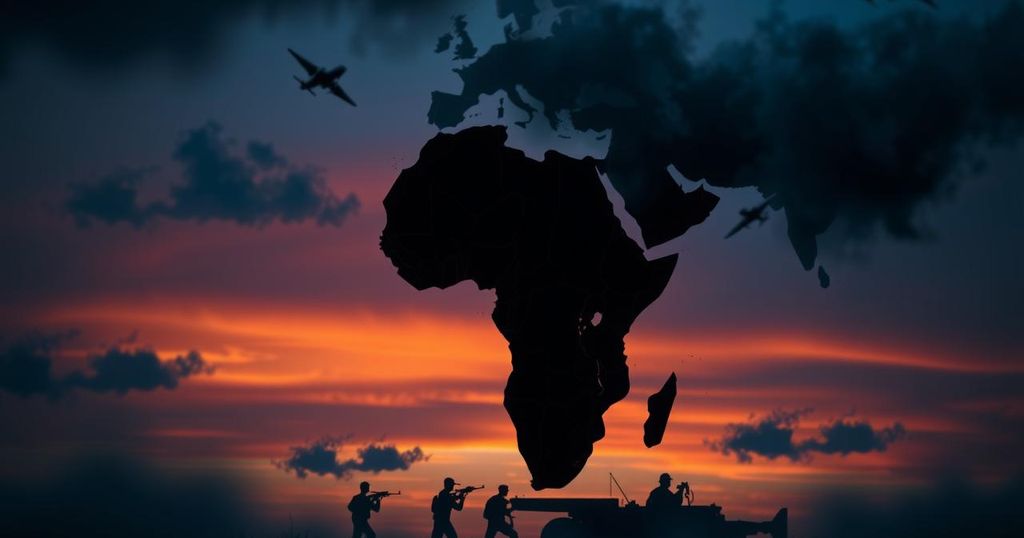M23 rebels have intensified their offensive in eastern DRC, leading to a reported death toll of at least 2,900 in the conflict over Goma. Despite recent ceasefire declarations, military activity has resumed with a focus on Bukavu. The upcoming summit between the DRC and Rwanda’s leaders may address escalating violence amid critiques of international responses to the crisis.
The M23 armed group, supported by Rwandan forces, has launched a new military offensive in eastern Democratic Republic of Congo (DRC), escalating tensions just prior to a scheduled summit between the Rwandan and Congolese presidents. The UN has reported that the recent conflict for Goma has resulted in a death toll soaring to at least 2,900, significantly higher than the previously reported figure of 900. Following a unilateral ceasefire declaration, the M23 and allied Rwandan troops resumed military activities, capturing a mining town in South Kivu province and advancing towards Bukavu, the province’s capital.
Intense conflict erupted around Nyabibwe, approximately 100 kilometers from Bukavu. The M23 had previously claimed it did not intend to seize Bukavu, casting doubt on their ceasefire commitment. Congolese government spokesman Patrick Muyaya characterized the ceasefire declaration as a deceptive tactic. Over three years of conflict with the M23 have involved numerous ceasefires, all ultimately breached, with military sources indicating reinforcements on all sides in recent days.
The capture of Goma marked a serious escalation in a region historically plagued by prolonged conflict. MONUSCO’s Vivian van de Perre disclosed that approximately 2,900 bodies had been recovered since the latest violence began, with fears that the death toll could rise further. International criminal court prosecutors have stated they are actively monitoring the recent surge in violence in eastern DRC.
Residents in Bukavu have expressed apprehension about the potential for their city to become the next target. During a peace service organized by local women, Jacqueline Ngengele articulated the community’s desire for an end to the persistent warfare. DRC President Félix Tshisekedi and Rwandan President Paul Kagame are anticipated to meet for a crucial summit in Dar es Salaam regarding the ongoing crisis.
In the lead-up to this summit, the UN Human Rights Council has scheduled a special session to address the escalating violence upon DRC’s request. Alongside regional mediators, various international governance organizations are pushing for a peaceful resolution to the conflict, yet DRC’s foreign minister, Thérèse Kayikwamba Wagner, has criticized the international response as lacking substantive actions.
Several neighboring countries are reinforcing their defenses in anticipation of a possible spillover from the conflict. A report from a UN expert last year indicated that Rwanda has deployed approximately 4,000 troops within the DRC, possibly seeking to exploit its rich mineral resources. Despite allegations, Rwanda has not formally acknowledged military involvement with M23, while claiming that DRC harbors the FDLR, a militia formed by perpetrators of the 1994 Rwandan genocide.
The conflict in the eastern Democratic Republic of Congo (DRC) has been ongoing for over three decades, marked by numerous armed groups and persistent violence. The M23, an armed group supported by Rwanda, has previously claimed to seek autonomy for the Tutsi population. The region is rich in minerals, causing international interest and conflict over resource exploitation. Despite numerous ceasefires and international attention, substantive peace remains elusive, exacerbating humanitarian crises and regional tensions.
The recent offensive by M23 and Rwandan forces represents a significant and alarming escalation of violence in the DRC. Despite international efforts and calls for peace, historical patterns suggest a continuation of conflict as local populations suffer and response mechanisms from global entities are criticized as ineffective. The impending summit between the DRC and Rwandan leaders may prove crucial in addressing the violence that has claimed thousands of lives.
Original Source: www.theguardian.com




